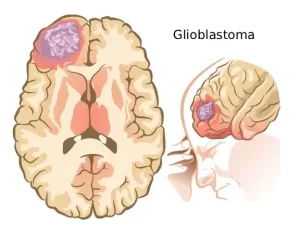Overview
Diagnosis
Diagnosing glioblastoma involves a combination of exams, imaging, and tissue testing. Healthcare professionals may use:
-
Neurological exam: Checks vision, hearing, balance, coordination, strength, and reflexes to identify areas affected by the tumor.
-
Imaging tests: MRI is most commonly used to determine the size and location of the glioblastoma. CT scans and PET scans may also be used. A dye may be injected to improve imaging results.
-
Biopsy: A tissue sample is removed with a needle or during surgery and sent to a lab to confirm cancer cells and provide additional information for prognosis and treatment planning.
Special tests on the cancer cells may give insight into treatment options and expected outcomes.
Treatment
Glioblastoma treatment depends on the tumor’s location, size, and the patient’s overall health. Options may include surgery, radiation, chemotherapy, and targeted therapies.
Surgery
A neurosurgeon may remove as much of the tumor as possible. Complete removal is often difficult because glioblastoma grows into healthy brain tissue. Post-surgery treatments typically aim to eliminate remaining cancer cells.
Radiation therapy
Uses high-energy beams such as X-rays or protons to kill cancer cells. Radiation is usually applied after surgery and can be combined with chemotherapy. For patients who cannot undergo surgery, it may serve as a primary treatment.
Chemotherapy
Powerful medicines target cancer cells. Chemotherapy can be administered as:
-
Pills during and after radiation therapy.
-
Intravenous infusions for recurrent tumors.
-
Biodegradable wafers placed in the brain during surgery to release medicine directly.
Tumor treating fields therapy (TTF)
Uses electrical fields to disrupt cancer cell division. Sticky pads connected to a portable device are placed on the scalp, often after shaving the head. TTF is typically used alongside chemotherapy after radiation therapy.
Targeted therapy
Medications attack specific chemicals in glioblastoma cells to induce cell death. Testing may determine whether targeted therapy is suitable. It is used for tumors that cannot be fully removed or for recurrent glioblastoma.
Clinical trials
Patients may participate in studies of new treatments, which could provide access to innovative therapies. Side effects may be unknown.
Symptom management
Medications may be prescribed to:
-
Control seizures.
-
Reduce brain swelling with steroids.
-
Manage headaches and other symptoms.
Palliative care
Specialized care focuses on improving quality of life during treatment. Palliative care teams support patients and families and can be provided alongside aggressive cancer treatments.
This multi-faceted approach helps manage glioblastoma while maintaining comfort and supporting overall well-being.
Advertisement

